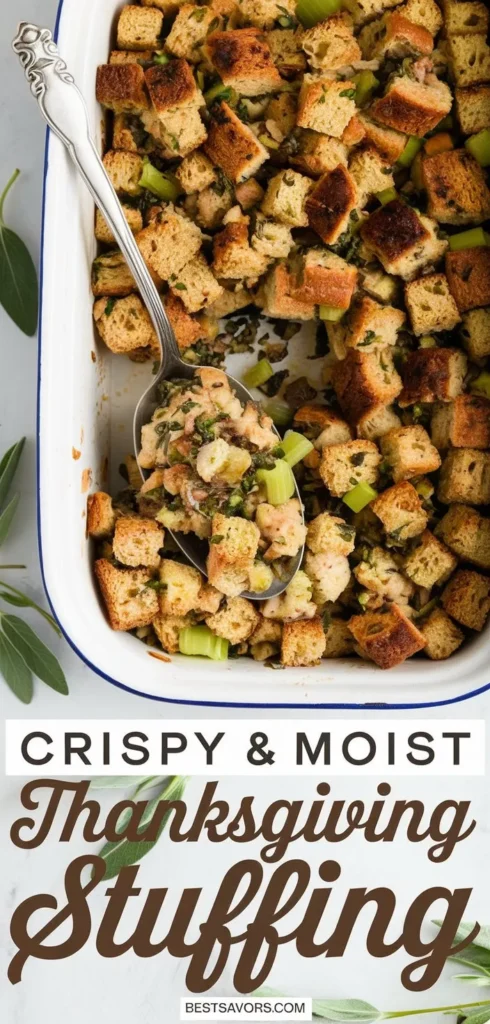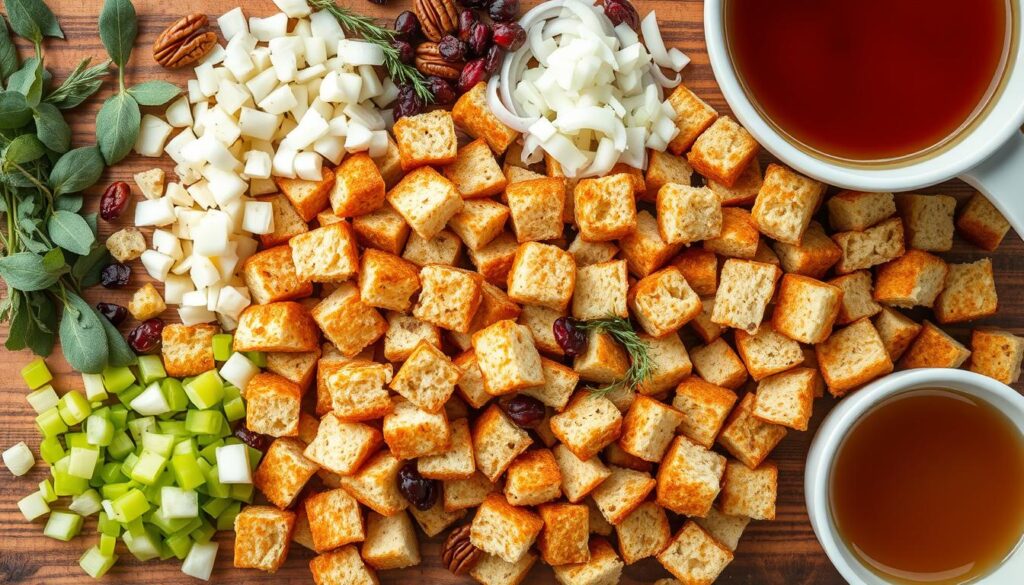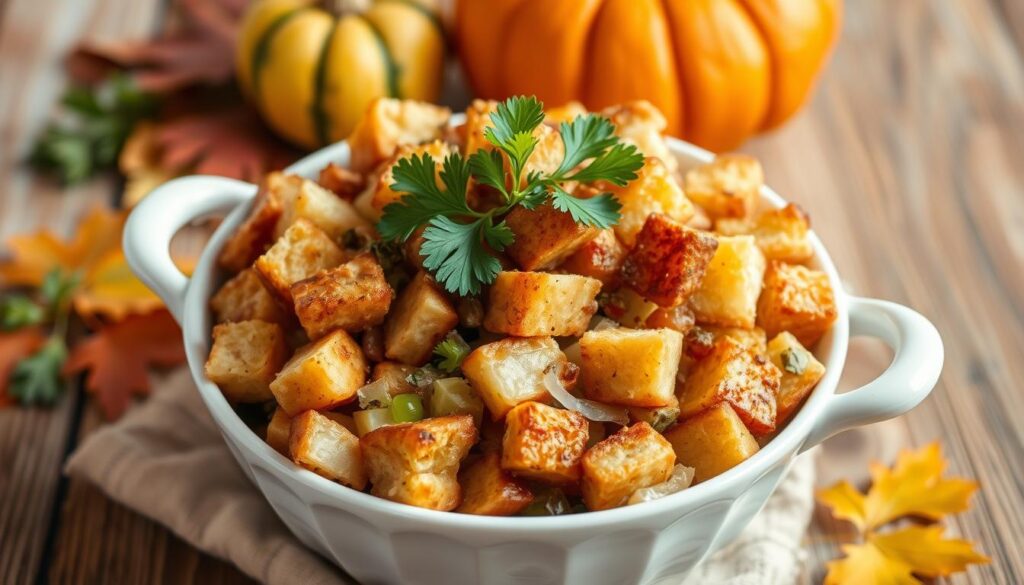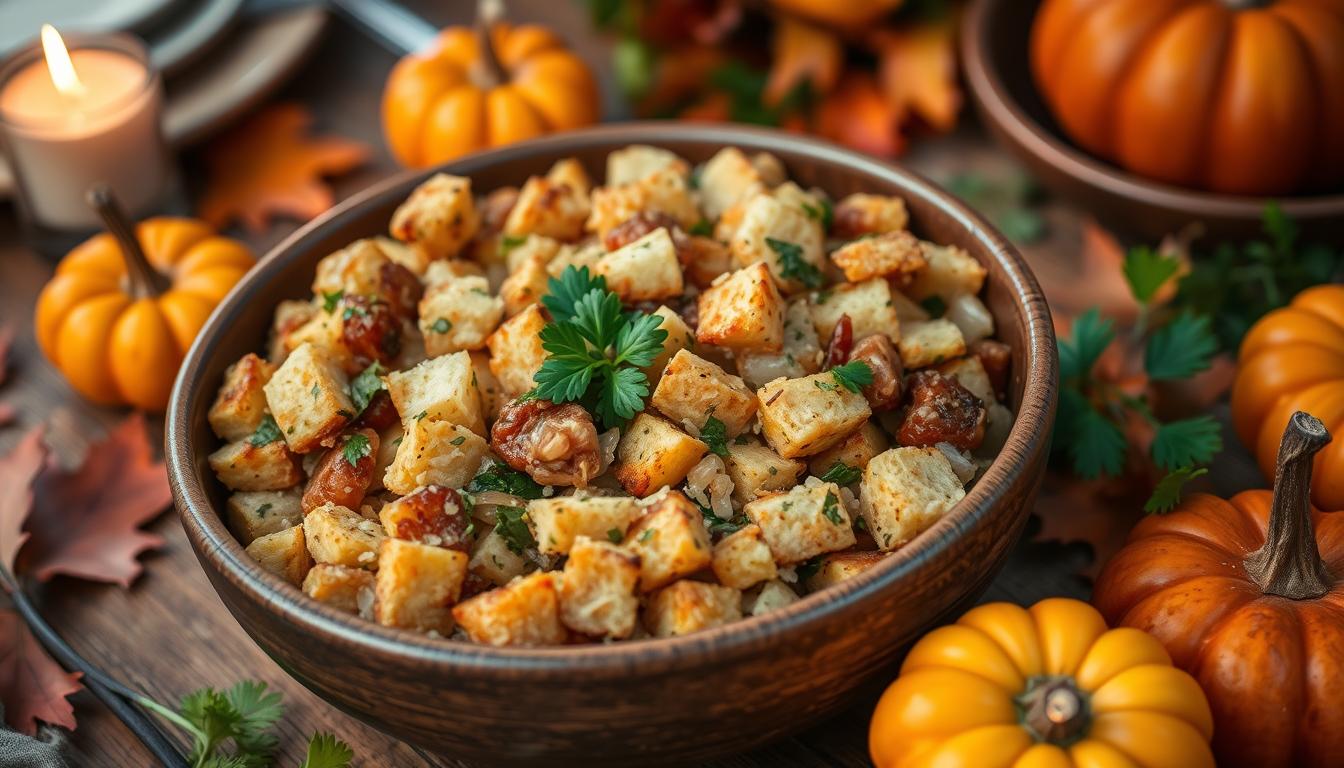As autumn arrives, my heart warms with Thanksgiving memories. This Thanksgiving stuffing recipe has been a family tradition for years. The smell of sautéed onions and herbs brings back happy childhood memories.
This stuffing is a true comfort food, loved by many. It’s made with dry bread, butter, and herbs. It has a crispy top and a moist inside, filled with the flavors of the season. It’s a dish that brings families together, enjoyed at holidays and beyond.
- Understanding Traditional Thanksgiving Stuffing
- Essential Ingredients for Perfect Stuffing
- Choosing and Preparing the Bread Base
- The Secret to Flavorful Aromatics
- Thanksgiving Stuffing: Step-by-Step Instructions
- Make-Ahead and Storage Tips
- Variations and Dietary Adaptations
- Serving and Presentation Suggestions
- Conclusion
- Source Links

Understanding Traditional Thanksgiving Stuffing
Thanksgiving stuffing, also known as dressing in some places, is a beloved tradition. The terms “stuffing” and “dressing” differ slightly. Stuffing is cooked inside the turkey, while dressing is baked in a dish. This recipe brings together the holiday’s essence, with a mix of flavors and textures.
The Role of Key Ingredients
The bread, butter, vegetables, herbs, and stock are key to this stuffing. The bread is the base, soaking up flavors well. Butter adds a savory aroma when sautéing vegetables.
Diced onions, celery, and carrots add sweetness and depth. Fresh sage and thyme give it a unique herbal taste. Turkey stock keeps the stuffing moist and flavorful.
Why This Recipe Stands Out
This stuffing recipe is special because of its balanced flavors and versatility. Eggs bind the stuffing, making it cohesive. You can stuff it into the turkey or bake it in a dish, capturing the essence of Thanksgiving.
| Ingredient | Quantity |
|---|---|
| Bread | 1 loaf, approximately 12 cups in 1/2-inch cubes |
| Unsalted Butter | 8 tbsp (1 stick) |
| Celery | 2 stalks, diced |
| Onion | 1, diced |
| Carrots | 2, diced |
| Turkey Stock | 1 quart |
| Fresh Sage | 2 tbsp, minced |
| Fresh Thyme | 2 tsp, minced |
| Kosher Salt | 1 1/2 tsp, plus 1/2 tsp |
| Freshly Ground Black Pepper | 1 tsp |
Essential Ingredients for Perfect Stuffing
Making the perfect bread stuffing for Thanksgiving starts with the right ingredients. You’ll need six main parts, plus salt and pepper for extra flavor.
The base of a great stuffing is 13-15 cups of dry bread cubes. Choose French or Italian bread for the best taste. You’ll also need 1.5 cups of unsalted butter to mix everything together and add richness.
Aromatic veggies are key in the sage stuffing. Use 2 cups of chopped celery and 2 cups of chopped yellow onions (about 1 large onion) for a savory start.
Seasoning is vital for the stuffing’s taste. Add 1.5 tablespoons of poultry seasoning or fresh herbs like parsley, sage, rosemary, and thyme. This will give your stuffing the classic Thanksgiving taste.
To keep the stuffing moist and together, use 1.5 cups of chicken stock or homemade broth. And don’t forget 2 large eggs to help everything stick together. This will make your stuffing fluffy and full of flavor, pleasing your guests.
With these ingredients, you’re set to make the perfect bread stuffing for Thanksgiving. Whether you like a traditional sage stuffing or something different, this recipe will be a hit with your family.

Choosing and Preparing the Bread Base
The bread base is key for a great Thanksgiving stuffing. You can choose from sourdough bread, French bread, or bread cubes. Each type gives a unique taste and texture.
Best Types of Bread to Use
Most people, 79%, like using white bread for stuffing. But, try sourdough or French bread for something different. They add special flavors to your dish.
Proper Drying Techniques
To soak up flavors, dry the bread cubes well. Cut the bread into 1-inch cubes and let them sit for 48 hours. Stir them a few times. Or, toast them in a 250°F oven for 45-60 minutes, watching to avoid burning.

Storage Tips for Bread Cubes
After drying, store the bread cubes in an airtight container. Keep them at room temperature for up to a week. This makes preparing your stuffing easier. Use 13-15 cups of tightly packed cubes for this recipe.
| Ingredient | Quantity |
|---|---|
| Crusty country bread, cubed | 2 lb. |
| Unsalted butter | 6 Tbsp. |
| Yellow onion, diced | 1 large |
| Leeks, diced | 2 medium |
| Garlic cloves, minced | 4 |
| Eggs | 2 large |
| Low-sodium chicken broth | 2 1/2 c. |
| Whole milk | 1 1/2 c. |
| Mixed chopped fresh herbs | 2 Tbsp. |
| Crushed red pepper flakes | A pinch |
The Secret to Flavorful Aromatics
The secret to a delicious Thanksgiving stuffing is in the seasoning of the aromatic ingredients. At the heart of this classic recipe are the sautéed vegetables – celery and onion. They add a rich, savory flavor to the dish.
To start, sauté 1 cup of chopped celery and 1 cup of diced yellow onion in 1.5 cups of unsalted butter. This takes 10-12 minutes. It lets the natural sugars in the vegetables caramelize, releasing their aroma and boosting the stuffing’s taste.
The butter adds a luxurious mouthfeel and carries the flavors of the celery and onion. As the vegetables soften and soak up the butter, they create a rich, savory base. This base is the foundation for the rest of the stuffing ingredients.
This step is key for the perfect flavor balance in the final dish. By properly sautéing the sautéed vegetables, your Thanksgiving stuffing will be filled with comforting aromas. These aromas make this holiday classic so beloved.
Thanksgiving Stuffing: Step-by-Step Instructions
Preparing the Base
Start by sautéing the vegetables for your homemade stuffing. In a large skillet, melt unsalted butter over medium heat. Add the finely chopped celery and onion, and sauté for about 5-7 minutes, stirring occasionally, until they are softened and fragrant.
Mixing the Ingredients
Next, transfer the sautéed vegetables to a large mixing bowl. Add the cubed bread and gently toss to combine. Then, stir in the fresh minced parsley, sage, rosemary, and thyme. Pour in the chicken stock, a little at a time, while stirring the mixture to ensure the bread absorbs the flavorful liquid. Lightly beat the eggs in a separate bowl and fold them into the stuffing.
Baking Methods
To bake the homemade stuffing recipe, grease a 9×13-inch baking dish with butter. Spread the stuffing mixture evenly in the prepared dish. Cover the dish with foil and bake at 350°F for 35 minutes. Then, remove the foil and continue baking for an additional 10-15 minutes, or until the top is golden brown and crispy.
If you’re using this baked stuffing as a turkey stuffing, simply spoon the mixture loosely into the cavity of the turkey just before roasting. Be sure to keep the temperature of the stuffing at 165°F or above to ensure food safety.

Make-Ahead and Storage Tips
This classic Thanksgiving stuffing recipe is perfect for making ahead. It makes hosting Thanksgiving easier. You can prepare stuffing ahead or freeze stuffing for later.
To make-ahead, bake the stuffing as directed. Let it cool completely. Then, put it in an airtight container and refrigerate for up to 4 days.
When you’re ready to serve, reheat the stuffing covered at 350°F. After it’s warmed, uncover and bake for 5-10 minutes to crisp the top.
For longer storage, the stuffing can be frozen for up to 3 months. Place the cooled stuffing in a freezer-safe container or bag. Thaw it in the fridge overnight before reheating.
Don’t forget about leftovers! Store them in an airtight container in the fridge for up to 4 days. Reheat gently in the oven or microwave before serving.
Preparing the stuffing ahead of time saves you stress on Thanksgiving. The flavors will blend better, making it even tastier. So, start preparing your Thanksgiving feast with this make-ahead stuffing recipe!
Variations and Dietary Adaptations
Thanksgiving is a cherished tradition, and the classic stuffing recipe is a favorite on many tables. But, for those with dietary restrictions or who want to try new flavors, there are many options.
Gluten-Free Options
For those on a gluten-free diet, traditional bread-based stuffing isn’t an option. Instead, use gluten-free bread or cornbread as the base. These alternatives offer a tasty texture and meet dietary needs.
Vegetarian Modifications
Vegetarians can modify the classic stuffing by using vegetable broth instead of chicken stock. They can also leave out any meat-based ingredients. Adding diced apples, dried cranberries, or chopped nuts can make the stuffing unique and flavorful.
To add more veggies to your Thanksgiving, try sautéed mushrooms, onions, celery, and herbs in your stuffing. This mix of savory and earthy flavors can give the dish a delightful twist.
Whether you have dietary restrictions or just want to try something new, the secret to a great stuffing variation is using high-quality ingredients. Experiment with different breads, broths, and add-ins to make a stuffing that suits your taste and dietary needs.
Serving and Presentation Suggestions
Make your Thanksgiving feast special by showing off your Thanksgiving side dish – the classic stuffing. Serve it hot with your roasted turkey, creamy mashed potatoes, and tangy cranberry sauce. This creates a perfect holiday spread. Add fresh herbs like parsley or sage to make it look and taste even better.
For a fancy look, bake the stuffing in individual ramekins or small roasted pumpkins. This makes each serving special and adds to the feast’s beauty. Before serving, add a bit of melted butter and a pinch of salt to bring out the flavors.
Whether you choose a traditional casserole or a creative display, your stuffing will impress everyone. These simple yet elegant ideas will make your stuffing the highlight of your holiday meal.
Conclusion
This classic traditional stuffing recipe is a perfect mix of flavors and textures. It’s a beloved Thanksgiving tradition. You can make it your own while keeping its timeless charm.
Whether you bake it in the oven or inside the turkey, it’s sure to impress. It brings warmth and comfort to your family’s Thanksgiving gathering.
The stuffing’s savory mix of ground meats, veggies, and herbs is irresistible. Its moist texture and bold flavors, from sweet to savory, make every bite a delight. Your guests will ask for more.
At Thanksgiving, this stuffing recipe will become a cherished family tradition. It’s a dish that brings people together, creating memories that last. Enjoy the flavors and the moments it brings to your feast.
Source Links
- My Grandma’s Best Stuffing Recipe. Over 60 years old! – https://www.tastesoflizzyt.com/grandmas-thanksgiving-turkey-stuffing/
- Stuffing Recipe – The Girl Who Ate Everything – https://www.the-girl-who-ate-everything.com/classic-stuffing-recipe/
- It Isn’t Thanksgiving Without Ree’s All-Time Favorite Dressing – https://www.thepioneerwoman.com/food-cooking/recipes/a11893/thanksgiving-dressing-recipe/
- Traditional Stuffing – https://www.wyseguide.com/traditional-stuffing/
- Classic Thanksgiving Stuffing Recipe – https://tastesbetterfromscratch.com/stuffing/
- The BEST Stuffing Recipe | foodiecrush.com – https://www.foodiecrush.com/best-easy-stuffing-recipe/
- Easy Stuffing Recipe – https://www.spendwithpennies.com/easy-stuffing-recipe/
- Traditional Stuffing Recipe – https://www.bettycrocker.com/recipes/traditional-stuffing-recipe/33c60498-d187-43ae-a189-c7f23377b734
- This Is The Only Stuffing Recipe You’ll Ever Need – https://www.delish.com/cooking/recipe-ideas/a55387/classic-homemade-turkey-stuffing-recipe/
- No title found – https://thefoodiephysician.com/lightened-up-holiday-stuffing-with/
- Thanksgiving Stuffing – https://thatovenfeelin.com/thanksgiving-stuffing/
- Traditional Bread Stuffing – Dishes With Dad – https://disheswithdad.com/traditional-bread-stuffing/
- Old Fashioned Thanksgiving Dressing Recipe – https://theperksofbeingus.com/old-fashioned-thanksgiving-dressing-recipe/
- The Best Old Fashioned Bread Stuffing – https://amindfullmom.com/stuffing-recipe/
- Stuffing – https://www.tasteofhome.com/recipes/thanksgiving-stuffing/?srsltid=AfmBOoqQA8CG-eAc3Ht-97e38bpZX7E0sbl_kYXHT8WnRbitOCm1Ep4S
- Cornbread Stuffing Recipe – https://www.kitchentreaty.com/cornbread-stuffing/
- Balancing Festivities, Family, and Food This Thanksgiving – https://www.nifs.org/blog/balancing-festivities-family-and-food-this-thanksgiving
- Try healthy alternatives to Thanksgiving soul food – https://defendernetwork.com/culture/health/this-thanksgiving-try-healthy-alternatives-to-soul-food/
- Best Stuffing Recipe and Tutorial (from my mom!) – https://cookthestory.com/best-stuffing-recipe-with-tutorial/
- How to make perfect roast turkey, stuffing and gravy. – https://www.artandthekitchen.com/roast-turkey-stuffing-and-gravy/
- Traditional Bread Stuffing with Herbs – Striped Spatula – https://stripedspatula.com/traditional-bread-stuffing/
- My mom’s go-to Puerto Rican stuffing is a Thanksgiving essential — with or without a turkey – https://www.businessinsider.com/puerto-rican-thanksgiving-stuffing-recipe-photos-2023-11
- Thanksgiving Turkey Stuffing Recipe 2024 | Kitchen Mastery – https://kitchen-mastery.com/thanksgiving-turkey-stuffing-recipe/?srsltid=AfmBOopIAE6Fjd9kBVd9gNhnVMHDqdxSvGtfONaVURFJRg7bf_o8ZzyY

